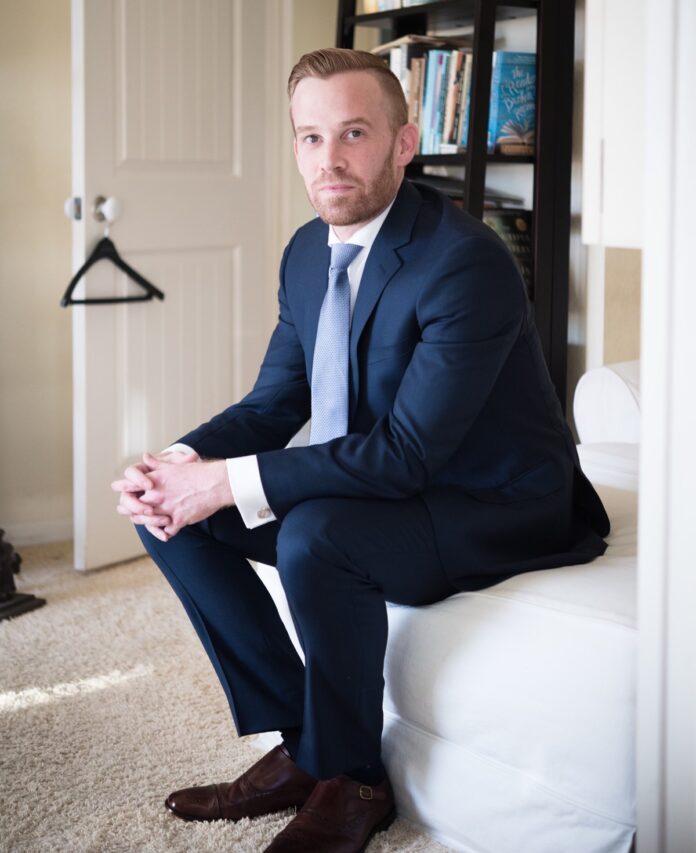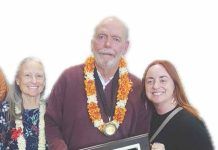International Overdose Awareness Day is Aug. 31. The numbers of all drug overdose related emergency department visits increased 26% from 2020 to 2023, and the number of opioid overdose related ED visits increased by 87% in the same period. Opioid and fentanyl overdosed deaths increased 94% and 131% respectively from 2020 to2021 and have remained stable at the higher level throughout 2021 according to the April 2023 County of San Diego Health and Human Service Agency Overdose Quarterly Report. Both overdoses and deaths are higher among males, and the increase of ED visits and deaths since the beginning of 2020 is highest among those 25 to 50 years old.
A former Sharp HealthCare patient, Cody Kreutz, began his experience with addiction at an early age, and his addictions worsened until at 33 years old he made the decision to receive help at Sharp McDonald Center, a Sharp HealthCare addiction treatment center. In 2023, Sharp McDonald Center was recognized by Newsweek as one of America’s Best Addiction Treatment Centers.
Kreutz, the youngest of five children, said that he was raised in a stable family with his parents still together today. And though he said he felt very loved, he always felt uncomfortable in his own skin and was extremely insecure about who he was.
“Even though I was loved, I always tried to get people to love me,” he said. “I thought I had to
earn it. When I turned around 13-14, I started experimenting with drugs and alcohol, mostly alcohol. Even at that young age I could not wait to try it. I was very curious about it. It immediately turned me into a more confident person. Especially with alcohol. It made me be the person I wanted to be, so I used alcohol a lot through 16 and 17.”
Kreutz said went to lots of parties, drank a lot, and became dependent on it at a young age.
“I was someone who was outgoing, confident, and funny,” he said. “Over time, it became more of a focal point in my life. From around 18 to 21, I was not doing anything with my life.”
Kreutz said he decided to move to Portland, Oregon to “get his butt in gear,” go to college and go into the workforce. For a couple of years, he was great. Earned his associate degree. Went to Portland State University, and the drinking started “creeping up” again, going to parties, clubs, and staying drunk for days.
“When I was about 26, I did this thing called Hair of the Dog, when you drink the next morning, so you do not feel so hungover,” he said. “I had this moment where I wanted to do hair of the dog, but I did not want beer, wine, so I had the bright idea to get some vodka so I would get drunk faster. That was the first time I went on a long binge, drinking two weeks every day.”
Kreutz said he moved back to San Diego at 30 years old. He was depressed and his drinking took over his life.
“I began drinking 24/7,” he said. “It affected my job, the relationship I was in. I had no arrests, no DUI, but I hit this emotional bottom. I was sitting in my car. I was exhausted. I was done. But I had not taken the time to see why I was doing these things. Very quickly after that, I came across these pain pills. My ex at the time had some pain pills. I stole one from her and a few minutes later I thought that this is what I had been looking for my whole life. I did not smell like alcohol. I had energy. I thought it was the key to my life.”
Kreutz kept telling himself that he could handle the painkillers, that he would be fine, but within a year and a half, he had completely destroyed his life and the people in it, he said.
“I became a person I did not even recognize,” he said. “I was stealing from my family. I stole my grandmother’s wedding ring who had passed away. I broke into my parent’s house. My in-law’s house. I became a person who had never done things like that, to a person I despised and hated. But at that time, I was out of control and could not help myself.”
All the thieving, all the lying, came to head at one time, he said, deciding that he did not deserve to live any longer.
“I always hurt people. I am never going to get better. The most unselfish thing that I can do is kill myself,” he said. “If I kill myself, they will be sad, but they will get over it. If I stay on this planet, I will continue to hurt them and that is way worse.”
Kreutz attempted suicide, but it did not work. He was devastated. He went to his parents’ home. Told them what he had done. And the next day, called a therapist not knowing what to do. She found him a bed at Sharp in Linda Vista in the psychiatric ward. They put him on suicide watch.
“I was open to anything I was so desperate. I cried for three days,” he said. “I was a mess. I was 33 years old. I was separated. I was just about to lose my job. I had nothing. On the fourth day, I kind of figured out that I was doing the right thing. My life was in shambles, but it was because of drugs and alcohol. Now, I was doing something about that. Maybe this was my chance.”
He stayed there seven days and said it was remarkable. He bonded with other people, found that they had similarities, then moved over to the McDonald Center Detox and Residential Services.
“I stayed there for 21 days,” he said. “It changed my life. I have made lifelong friends there. I did not leave anything off the table. I never wanted to do drugs again. I never wanted to use alcohol again, so I gave it everything I got. I went to every meeting, every counseling session, I met with my therapist, my psychiatrist, everything. It completely changed my life. It was the most incredible experiences of my life, if not the biggest and best experience of my life.”
Kreutz went from inpatient care to in-sober living for 13 months.
“The rest is history,” he said. “I met my wife in recovery. We have three beautiful children. We have been married for six years, together almost 10 years. Sharp was the catalyst for me building the foundation of the life that I get to live now.”
Kreutz said there was a counselor at Sharp who made him immediately feel that he would be okay. He said the counselor saw the hurt, the lies, and told him it was time for no more secrets. He was in a safe place, and he believed him.
“I decided after that conversation that I was not going to keep any secrets. I was going to tell him everything that had happened to me. I was going to allow myself to heal,” he said. “He was my counselor through the whole thing. The other counselors were absolutely amazing. The entire experience is exactly what I needed.”














